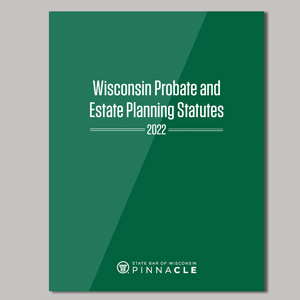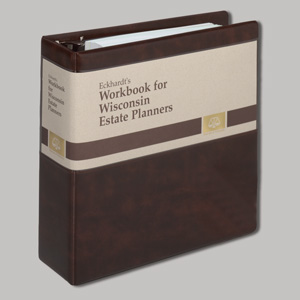
March 1, 2023 – There is much more to estate planning than simply drafting a will. Attorneys need to work closely with their clients to design a personalized, comprehensive estate plan that will fulfill their client’s needs.
Attorneys should become familiar with their client’s personal, professional, and financial situations, requirements, and goals. Often a client’s main objectives will be to avoid probate, tax implications, and delay in getting property to their heirs.
An attorney can help their clients consider and plan for a multitude of other related issues such as long-term care, medical assistance, marital property, trusts, asset protection, and business succession planning.
Clients may equate estate planning with drafting a will. However, estate planning may also involve creating trusts, changes to property ownership, durable powers of attorney, advance directives, and marital property agreements.
Attorneys can help their clients navigate the complexity of estate planning. The sources and tools presented in this article will help attorneys develop a comprehensive estate plan to meet their client’s objectives.
Background: Statutes and Restatements

The State Bar of Wisconsin PINNACLE® publication
Wisconsin Probate and Estate Planning Statutes 2022 compiles the numerous and varied laws affecting clients and estate planners. This convenient volume is especially helpful to attorneys new to estate planning.
Attorneys must be aware of the tax implications of estate planning. A frequent goal is reducing or eliminating estate and gift taxes as well as income taxes for the client, any trusts, and beneficiaries. Many of the books cited here contain chapters or sections dedicated to state and federal tax law. The Internal Revenue Service’s
Estate Tax page, related topics pages, and FAQs may also be of help.
Restatement of the Law (3d) of Property – Wills and Other Donative Transfers addresses the core of estate planning and the application of other fields of law including federal and state tax law, corporate, partnership, contract law, agency, and domestic relations law. Coverage includes will substitutes, intestacy, gifts, present and future interests, and construction of donative documents.
Other relevant restatements include
Restatement of the Law (3d) of Trusts and
Restatement of the Law Charitable Nonprofit Organizations. Restatements are available on HeinOnline and can be accessed with a Wisconsin State Law Library card.
Wisconsin Estate Planning Books

The attorney practicing in this state is fortunate to have a number of Wisconsin-focused legal practice books on estate planning.
Eckhardt’s Workbook for Wisconsin Estate Planners,
published by PINNACLE, is designed for lawyers at all levels of experience. The first two chapters provide an overview of the estate planning process. Subsequent chapters focus on wills, trusts, taxes, non-probate assets, gifts, marital property agreements, closely held businesses, and powers of attorney for health care and finances.
Eckhardt’s contains sample forms, but advises that it is imperative for the attorney to revise and adapt the forms to fit the client’s particular circumstances. Consulting the Master Information List ensures not missing significant information in the client interview.
Other helpful PINNACLE titles include
Advising Older Clients & Their Families,
Advising the Evolving Family, which contains a chapter on estate planning for unmarried couples,
Wisconsin Probate System: Forms and Procedures Handbook, and multiple chapters in the
Wisconsin Attorney’s Desk Reference and
Marital Property Law & Practice in Wisconsin.
Three titles within the Wisconsin Practice Series published by Thomson Reuters provide overviews of relevant estate issues.
Methods of Practice and
Elder Law include chapters on estate planning, will drafting and execution, trusts, and powers of attorney.
Death in Wisconsin provides a comprehensive overview of post-mortem administration that will be helpful to consider in the estate planning decision-making process.
Treatises
For a comprehensive analysis of all aspects of wills and probate, consult
Page on the Law of Wills (LexisNexis®). The ten-volume set discusses topics such as will substitutes, testamentary capacity, will amendment and revocation, living wills, and generation-skipping transfer provisions. One volume is dedicated to forms and provides sample clauses as well as entire wills and trust documents.
Page includes helpful citations to case law and statutes from all 50 states.
Page on the Law of Wills is available on
Lexis Digital and can be accessed with a
Wisconsin State Law Library card.
 Amy Crowder is a librarian with the Wisconsin State Law Library. She is currently serving as president of Law Librarians Association of Wisconsin (LLAW), whose members regularly contribute to
InsideTrack.
Amy Crowder is a librarian with the Wisconsin State Law Library. She is currently serving as president of Law Librarians Association of Wisconsin (LLAW), whose members regularly contribute to
InsideTrack.
Bogert Trusts and Trustees (Thomson Reuters) is an authoritative source that provides analysis and practical guidance on how to proceed under particular circumstances.
Bogert discusses all aspects of trusts including express private trusts, charitable, constructive, testamentary, revocable and irrevocable, insurance, and business trusts. This multi-volume set includes two volumes of trust forms.
Scott and Ascher on Trusts, a scholarly publication from Wolters Kluwer, is a leading authority offering guidance on all kinds of trusts. This title includes exhaustive citations to primary and secondary sources.
Thomson Reuter’s
Revocable Trusts is a practical guide to drafting and executing revocable living trusts and avoiding probate and tax implications. This title includes more than 100 forms.
Additional Estate Planning Books
Estate Planning for Farmers and Ranchers (Thomson Reuters) addresses the unique estate and retirement planning issues facing farmers.
Family Estate Planning Guide (Thomson Reuters) offers expert answers to client questions such as estate, gift, and generation-skipping transfer tax, succession arrangements and property preservation, and charitable transfers.
Estate and Entity Planning: Family Business Organizations (Thomson Reuters) follows the legal life cycle of a family business including the passage of the business through the estate administration process and post-death management.
Other helpful titles include
Tax, Estate, and Lifetime Planning for Minors (ABA),
Special Needs Trusts (NOLO), and several titles in West Academic’s Nutshell series, including
Introduction to Estate Planning in a Nutshell, Wills and Trusts in a Nutshell, and
Elder Law in a Nutshell.
Forms
PINNACLE offers the
Estate Planning/Probate Forms Library, which contains numerous customizable forms and clauses. Highlights include the Master Information List for Estate Planning, client checklist and letter, a basic will without trust, alternative and optional will provisions, marital property agreements, a cohabitation agreement, revocable trusts, nonstatutory power of attorney forms, and probate forms. Forms are taken from
Eckhardt’s Workbook for Wisconsin Estate Planners and the
Wisconsin Probate Systems: Forms and Procedure Handbook.
Consider consulting statutory forms as well. The Wisconsin Basic Will and Wisconsin Basic Will with Trust appear in
Wis. Stat. chapter 853. The
Wisconsin Statutory Form Power of Attorney for Finances and Property appears in Wis. Stat. chapter 244 and
Power of Attorney for Health Care in Wis. Stat. chapter 155. You can download printable versions of the power of attorney forms from the Wisconsin Department of Health Services
advance directives page.
A number of the books mentioned earlier in this article contain sample forms along with alternative language appropriate to difference circumstances. Additional sources, published by Thomson Reuters, include
American Jurisprudence Legal Forms 2d trusts and wills volumes,
American Jurisprudence Pleading and Practice Forms,
Nichols Cyclopedia of Legal Forms Annotated, and volumes 16-18 of
West’s Legal Forms. These books are also available via Westlaw.
CLE Opportunities and the RPPT Section
PINNACLE offers a number of Wisconsin-focused CLE seminars on estate planning issues, which will help you enhance your knowledge. Current online opportunities include the 2023
Step-by-Step Estate Planning I and
Step-by-Step Estate Planning II.
Alternatively, focus your training on topics such as Social Security, Medicare, virtual assets, or multigenerational planning for the family cabin or vacation property. Both live webcasts and OnDemand opportunities are available. Visit the
WisBar.org Marketplace to locate current estate planning CLE seminars and resources.
The State Bar of Wisconsin Real Property, Probate, and Trust Section (RPPT) offers the opportunity to network with other lawyers who share common interests in estate planning. Section membership is free for first-year attorneys. To join the section, log in to WisBar.org and visit the
RPPT Section webpage.
Librarians are Ready to Help
Many of the above-mentioned books and sources are available at your local law library. Librarians are ready to help with your estate planning research:
